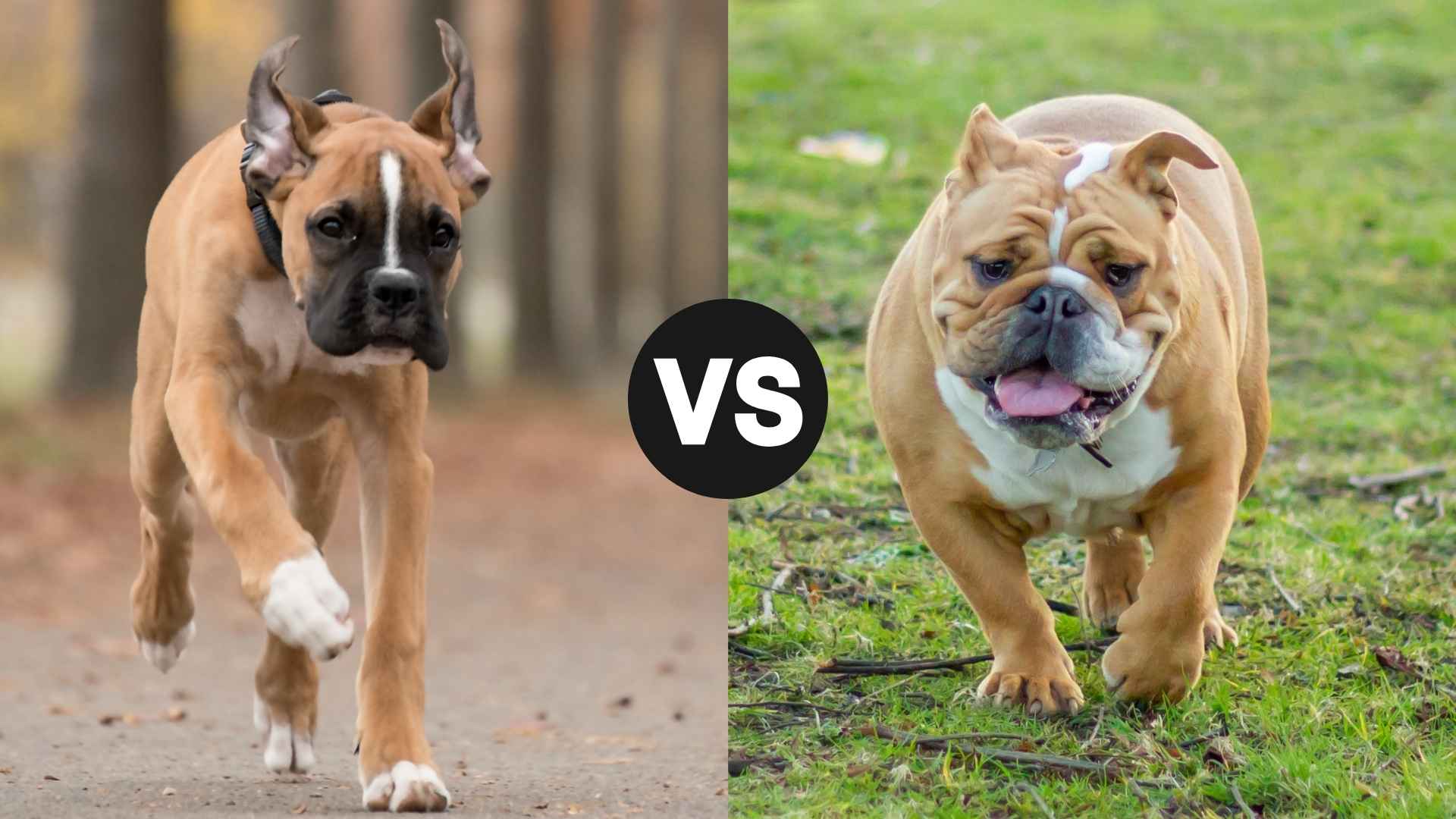Thinking of getting a dog but torn between the energetic Boxer and the laid-back Bulldog? You’re not alone—these two breeds are total opposites in personality, energy, and even looks, which makes the choice kind of tricky… and super interesting.
Boxers are goofballs with serious athletic vibes. They’re always up for a run, a game of fetch, or just bouncing around like oversized puppies. Bulldogs? They’re the ultimate chill buddies. Couch potato royalty. Give them a cozy spot and a snack, and their playful nature makes them live the dream.
But it’s not just about energy levels. These breeds differ in how they bond, how they train, and even how they handle the weather. Yep, one of them is basically allergic to heat—and the other? Can’t stop zooming around even in winter.
So, if you’re weighing loyalty vs. laziness, or muscle vs. mellow, let’s break it all down and help you pick your perfect match.
Boxer vs. Bulldog: Key Differences
Boxers and Bulldogs, two popular dog breeds, might be lovable in their own way, but they’re worlds apart when it comes to energy, build, and vibe. Boxers are lean, muscular athletes who thrive on action—they need daily exercise and love staying busy. Bulldogs, on the other hand, are stocky, low-energy charmers who prefer naps over laps around the park.
Training a Boxer? You’ll need patience and consistency to match their spirited nature. Training a Bulldog? Well, good luck—they’re famously stubborn but oh-so-worth it.
Even their health concerns differ: Boxers are prone to heart conditions, while Bulldogs often struggle with breathing and overheating. It’s a classic case of high-octane vs. slow-and-steady—what’s your speed?
|
Trait |
Boxer |
Bulldog |
|
Energy Level |
Very high – loves to run, play, and stay active |
Low – prefers lounging and short walks |
|
Temperament |
Playful, alert, loyal |
Calm, stubborn, affectionate |
|
Trainability |
Smart but needs consistency |
Stubborn and slow to train |
|
Build |
Lean, athletic, muscular |
Stocky, compact, broad-chested |
|
Exercise Needs |
At least 1–2 hours daily |
20–30 minutes is plenty |
|
Health Issues |
Prone to heart problems and cancer |
Prone to breathing and joint issues |
|
Heat Tolerance |
Moderate – handles warm temps okay |
Low – overheats easily |
|
Family Compatibility |
Great with active families and kids |
Great with kids, best for chill households |
Boxer vs. Bulldog
Boxer vs. Bulldog: Temperament
When it comes to temperament, Boxers and Bulldogs are like two dogs from totally different planets. Boxers are full of life—curious, bouncy, and always alert. They’re the kind of dogs that think everything is a game, and everyone is a potential playmate.
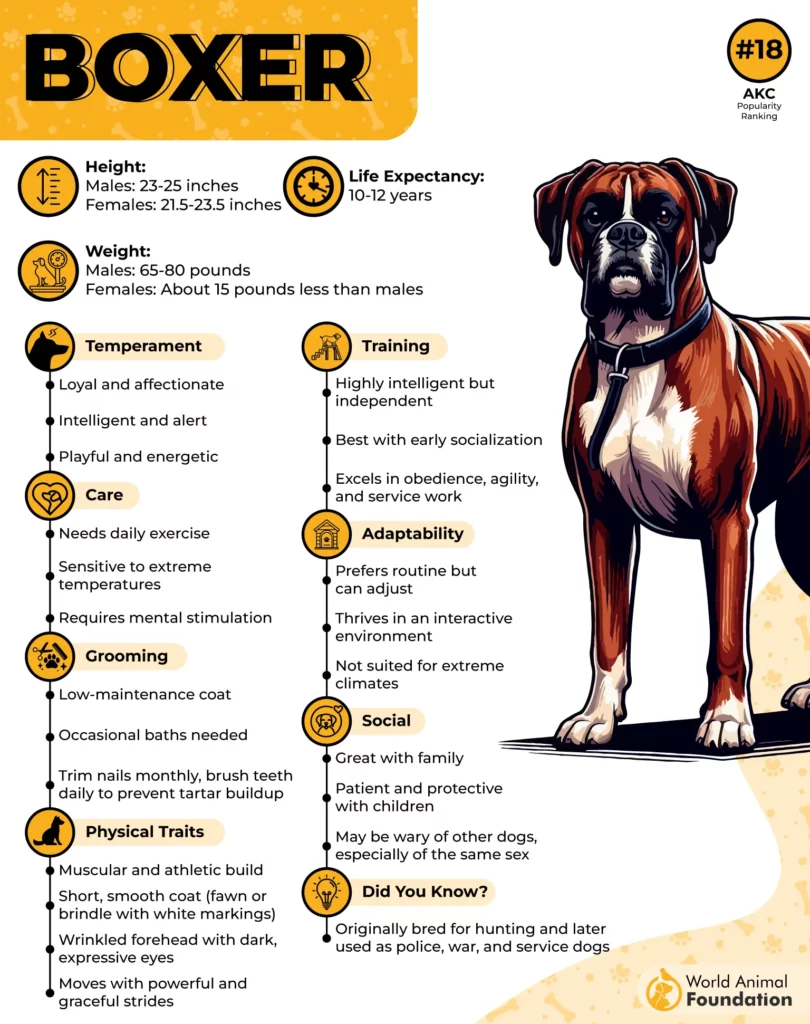
Bulldogs? Total opposites. They’re calm, collected, and low-key affectionate. You won’t find them bouncing off walls, but you will find them snuggled into your side like a chubby heat pack.
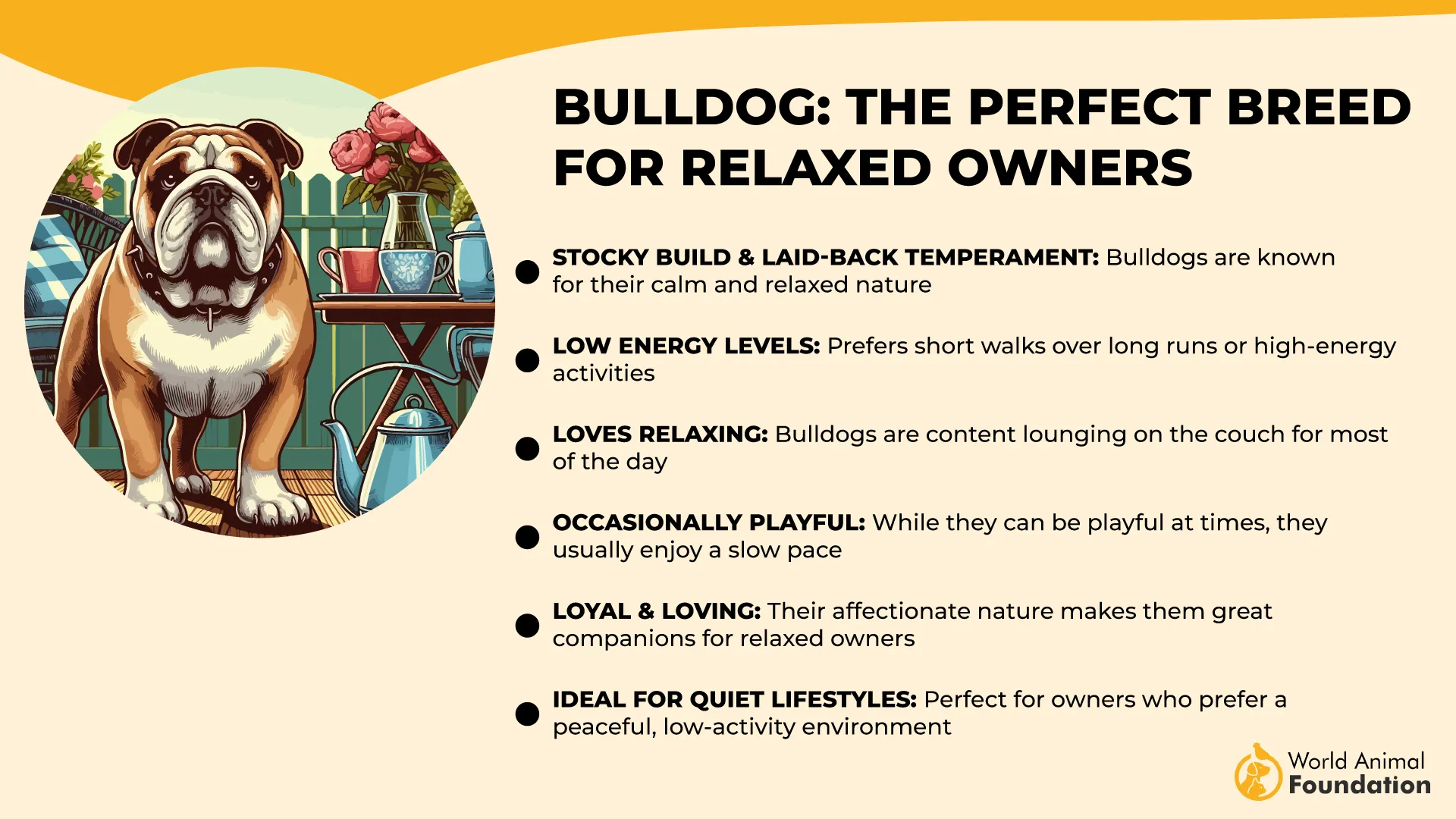
Boxers
Boxers have a real “let’s go!” attitude. According to Purina, they’re loyal to a fault and always on guard due to their protective instincts, making them awesome watchdogs. They’re also super social—sometimes too social, which means early training is a must to help them focus. Have kids at home? Boxers usually adore children and can be the ultimate goofy companion, as long as they’re given enough outlets to burn off energy.
Bulldogs
Bulldogs, on the other hand, are cool customers. They’re stubborn dogs (oh yes, very stubborn), but they make up for it with tons of quiet affection, says Omlet. They won’t chase a ball for hours, but they will follow you from room to room like a slow-moving shadow. Not big barkers, not overly clingy—just chill and charming. They’re especially great for families who want a dog that’s more relaxed than rowdy.
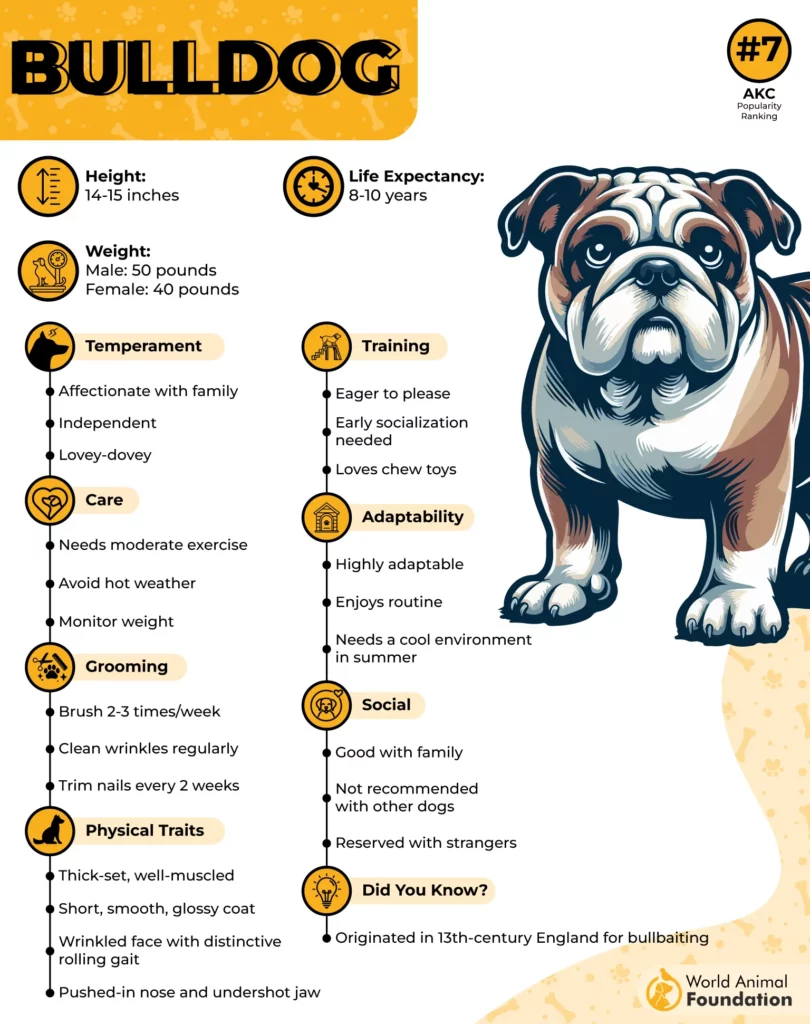
Boxer vs. Bulldog: Intelligence
Let’s talk brains—because while both Boxers and Bulldogs are smart and intelligent in their own ways, they’re definitely not cut from the same mental cloth.
Boxers
Britannica says that Boxers are sharp, alert, and quick to pick up on new things… when they feel like it. They thrive on mental stimulation and actually need it to stay out of trouble. Give them a challenge, and they’re all in. But leave them bored? Don’t be surprised if they start inventing their own “fun.”
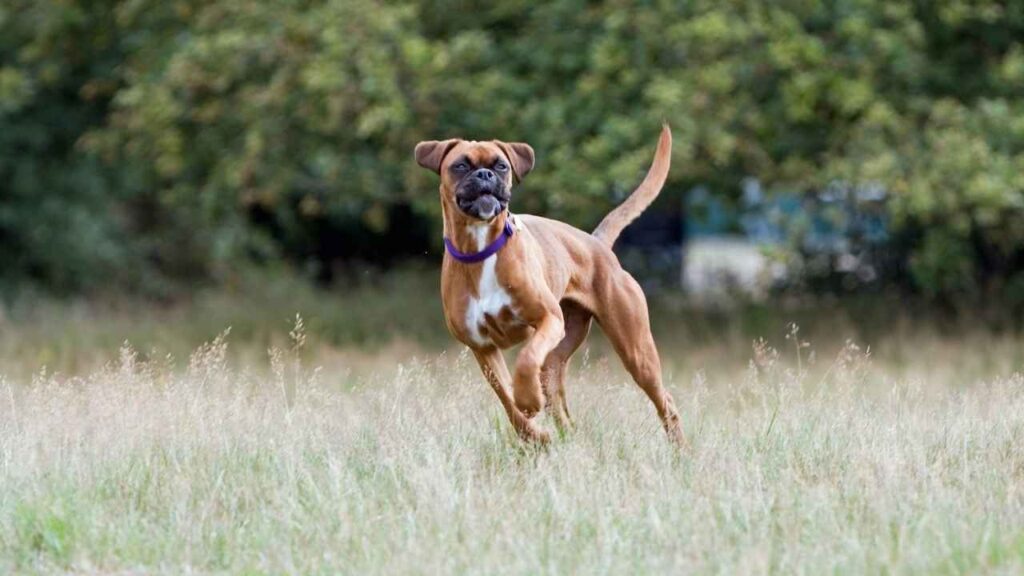
Quick learners, especially with consistency
Respond well to positive reinforcement
Can get bored easily without variety
So who’s smarter? Depends on how you define “smart.” Boxers are fast thinkers who love a challenge. Want a clever dog with energy to match? Go Boxer.
Bulldogs
Now, their intelligence is a whole different flavor. They’re not dumb—they just don’t care to prove themselves. Bulldogs are known for their “selective hearing” and legendary stubborn streak. Ask them to sit, and they’ll probably think about it… for a while. But once they decide to listen, they’ve got a surprisingly good memory.

Stubborn but not clueless, says VCA
Often test limits just to see what they can get away with
Do best with short, positive, and low-pressure training sessions
Bulldogs are slower but sly—kind of like the dog version of “book smart vs. street smart.” Prefer a laid-back thinker who does things their own way? Hello, Bulldog.
Boxer vs. Bulldog: Common Health Issues
Here’s the not-so-fun part: both Boxers and Bulldogs come with a few health red flags, and knowing what to expect can save you a lot of worry—and vet bills—down the road.
Boxers
Let’s start with Boxers. These athletic pups might look like they’re built to last, but they’re genetically prone to some serious stuff. Petplan says that heart problems are a biggie, especially Boxer cardiomyopathy, a condition that can cause fainting or even sudden death.

Scary, right? They’re also one of the breeds most at risk for certain cancers, especially mast cell tumors.
High risk of heart disease (especially arrhythmias)
Prone to hip dysplasia and arthritis
Susceptible to cancers like lymphoma and mast cell tumors
So yeah, both breeds need regular vet care and proactive attention to health. Boxers might be the more athletic of the two, but that doesn’t make them low-maintenance.
Bulldogs
Now, Bulldogs… where do we begin? Their adorable, smooshy faces are cute, but they come with major breathing issues. Brachycephalic syndrome is the main culprit, making it hard for them to breathe, especially in the heat or after exercise.

Bulldogs also deal with joint problems, skin infections, and can have chronic digestive issues. Plus, thanks to their narrow hips and large heads, natural births are almost impossible—they usually need C-sections.
Common respiratory issues, says Britannica
Skin folds can trap bacteria and cause infections
High risk of joint problems and overheating
Bulldogs are adorable and chill, but they’re basically walking vet appointments without proper care. Planning ahead for their specific needs isn’t optional—it’s part of the deal.
Boxer vs. Bulldog: Average Lifespan
When it comes to lifespan, the Boxer usually outpaces the Bulldog—literally and figuratively.
Boxers
On average, Boxers live around 10 to 12 years, and if you keep them active, mentally stimulated, and on top of their health checks, they can enjoy a solid, vibrant life well into their senior years. That said, their higher risk of cancer and heart disease can sometimes cut things short, which is why early detection and regular vet visits are so important.

Average lifespan: 10-12 years, says AKC
Needs regular exercise and vet screenings
Quality of life stays high with proper care
Boxer tends to stick around a little longer, both breeds need attentive care to hit their full potential.
Bulldogs
Now Bulldogs? Their lifespan is usually shorter, around 8 to 10 years, and that’s mostly due to their long list of structural health issues. Their breathing problems, skin fold infections, and joint trouble can really take a toll. But with a committed owner who’s proactive about their care—think weight management, skin cleaning, and no overheating—they can absolutely live a full, happy life.

Average lifespan: 8-10 years, says PetMD
Needs extra care due to breathing and joint issues
Best in cool environments with minimal physical strain
Planning for their specific needs isn’t just helpful—it can add years to their lives. Pretty worth it, right?
Conclusion
When comparing the Boxer vs. Bulldog, it’s clear that both breeds bring something totally different to the table. Boxers, originally bred for hunting large game like wild boar and even used in bull baiting, are known for their athletic, energetic, and loyal nature. They bond deeply with their owners and thrive in active families with a spacious yard where they can run, jump, and play. Boxer dogs tend to be good family dogs, more suitable for homes with older kids, as their playful and bouncy behavior might be too much for very young children.
Bulldogs, especially the English Bulldog, come from a tough lineage but are now known as cute, low-maintenance, and affectionate family companions. With their short coat, smooth coats, and compact physical characteristics, they require minimal grooming—just a weekly go-over with a rubber curry brush to remove loose hair and help prevent infections. English Bulldogs aren’t built for warm weather or hot weather, so keeping them cool and indoors is key. While stubborn, they can learn good behavior with consistent obedience training and early socialization.
Both breeds have their share of health issues. Boxers are prone to hip and elbow dysplasia, aortic stenosis, and certain cancers. Bulldogs are also susceptible to hip dysplasia, breathing difficulties, and overheating. No matter which dog breed you choose, regular vet check-ups, proper food, and lots of love are essential. Want a dog that’s always ready to play, bark at strangers, and guard your home? The Boxer is your guy. Prefer a loyal snuggler who’s more into sitting than sprinting? The Bulldog might be the better fit. Whatever your choice, making an informed decision ensures a happy life for you and your furry best friend.


